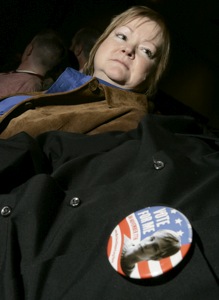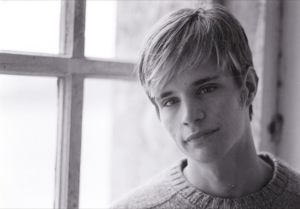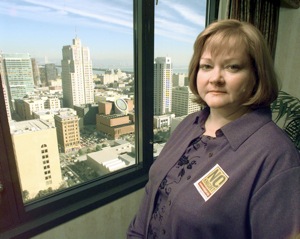-
- Methodists attend same-sex commitment ceremony
- Young religious voters hope to use faith for larger social change
- Senator says slavery would pass in a secret ballot
- Presbyterian Church clears minister in same-sex marriage case
- McGreevey divorce trial begins this week
- Officials want HIV screenings for all inmates
- National News Briefs
- World News Briefs
feature
One Mother’s Fight
Ten years after Matthew’s murder, Judy Shepard discusses her son’s legacy
Published Thursday, 08-May-2008 in issue 1063
Judy Shepard’s voice is quiet and thin. She spent last weekend in Ohio and Pennsylvania, and returned to Denver just hours before taking our call.
She’s tired; not necessarily from the weekend’s travels, or the schedule that keeps her away from her husband, Dennis, and son, Logan, or the fund-raisers and gala appearances, though all that surely takes its toll.
It seems, instead, she’s tired from the decade-long crusade she’s waged for her son Matthew, whose murder in October 1998 stunned the nation. Matthew, a 21-year-old student who was gay, was robbed, pistol-whipped, tortured and tied to a fence in Laramie, Wyo., left for dead.
His story cultivated a renewed fight for federal hate crimes legislation – and his mother, once a housewife, suddenly became an activist. As executive director of the Matthew Shepard Foundation, Judy Shepard tours the nation, pleads with elected officials, and shares her story.
She didn’t know 10 years ago that the battle would last more than a decade. Despite the fact she is tired, she’ll fight as long as it is necessary to expand federal hate crimes laws, a fight she hopes to win in 2009 after the presidential election.
Days before Mother’s Day, Sunday, Judy talked with the Gay & Lesbian Times about the legislation, which was named the Matthew Shepard Act, the foundation’s new resources for youth, and her son Matthew’s legacy.
Gay & Lesbian Times: You’ve shared Matthew’s story and advocated for hate crimes legislation and non-discrimination legislation now for 10 years. Does talking about your son help or hinder the healing process?
Judy Shepard: If it was hindering the healing process, I wouldn’t be doing it. It’s very cathartic for me, and at the same time, I feel like I’m helping Matt’s community and friends. It’s a major part of my [healing] process.
GLT: It must be difficult when people ask you this, but would you tell us a bit about your son Matthew (what his sense of humor like, one or two of your favorite memories of Matthew, etc.)?
JS: He had a great sense of humor. Very dry, very witty, like his dad. He loved puns and the play on the words. He had a wonderful laugh that just engaged his whole body. I don’t really have any particular memories I would share. I don’t really think of him in terms of particular memories. I don’t know if that’s odd or typical, but there are, overall, just things that I miss and remember. Nothing, though, that would define him in any way.
GLT: Your husband, Dennis, and your son, Logan, are also active with the foundation. How has Matthew’s murder changed the family dynamic, and how have you held your family together?
JS: We made a family decision that we would take advantage of this opportunity to try to make a change. We didn’t know the window would last 10 years. With Matt’s story in the press, we knew if our stories were heard, people who were concerned about the situation could do something to make a difference. I’ve lived here [Denver] without my husband for two years and Logan moved here to work with the foundation, but we’ve not really been together as a family for 10 years – that’s what has changed the most. But, we all know why we’re doing this, we know what’s right and wrong, we understand advocacy and how to get something done.
If there’s one thing we’ve learned in all this it’s that every day is so, so important. Every day is the most important day of your life.
GLT: Since Matthew’s murder, you’ve become an advocate for hate crimes and non-discrimination legislation. You told USA Today a title for your memoir on the road could be Ten Years of Change and No Progress. Tell us what you mean when you say there has been change and no progress.
JS: We’ve learned that change really has to come from the grassroots as well as from the top down. In the Clinton years, we learned top down doesn’t work and we have to work to change the hearts and minds of people. With the Bush administration, through the years, we’ve learned we’re really not going to get anything from the administration. When the two come together, which I believe they will in the next administration, we’ll reach more peoples hearts and minds and they’ll feel more free to be who they are. But, with this administration, we’re shut down. The press has quit writing, people have quit listening – we’ve had some effect in television and media, literature. We’ve realized change comes from real people, not just political figures, except those elected at the start of the change in 2006, and even in 2004 – more so in 2006, though.
GLT: Sen. Carl Levin (D-Mich.) wants to use a defense policy bill to expand federal hate crimes laws. Last year, Democrats tried to attach a similar measure on the defense authorization bill. Are these necessary maneuvers to passing hate crimes legislation? If so, why?
JS: It has to do with rules and the situation in the senate, the reason they keep attaching it to something else. If you’d like more details, you’d have to do the research. I would certainly hope we keep the same list of friends and allies when it is passed. I’m confident that no matter what happens this year, in 2009 it will all be OK.
GLT: Why is expanded hate crimes laws a partisan issue, and what is the Matthew Shepard Foundation doing to make it a nonpartisan issue?
JS: You’ve just asked the $65,000 question. I have no idea why this is a partisan issue. I used to think it was White House leadership and congressional leadership that wouldn’t let anything happen that would be viewed as pro-gay by their core group of supporters, because they don’t want to alienate their base. But I’m not really sure that’s the case anymore. I don’t really know why it’s a partisan issue. I think representatives don’t listen to their constituents. More than 70 percent of Americans want these bills to go through, so I can’t really explain it. It seems sort of backward to me.
GLT: After 10 years of fighting for expanded hate crimes legislation, are you angry or frustrated that not much progress has been made?
JS: I’m not angry. I’m very frustrated. I am very frustrated. I can’t claim to have any understanding of what happens in D.C. or how it works, but it wouldn’t be productive for me to be angry. Well, maybe it would. I just know that I have to keep fighting until it’s done, so we can move on, so we can achieve a level of equality.
GLT: Tell us a bit about the youth-focused Web site, MatthewsPlace.com, which the foundation launched in October.
JS: You are right, it’s a youth-oriented, driven Web site. One of the things we began to learn was how little information direct service organizations had to share. It wasn’t that they didn’t want to share. They didn’t know each other existed. So the Web site is a place organizations can share information and post locations and what they provide. We understood it [the site] had to be youth-oriented to keep kids coming back, so it has podcasts and blogs, and once we get the technology down, we’ll have moderated chats and bulletin boards. We felt young people had a tougher road ahead of them. We felt the information is necessary. Kids are coming out so much younger now and it requires them having more information.
GLT: Fifteen-year-old Oxnard boy Lawrence King was murdered at school. What was your reaction to Lawrence’s murder, and what can be done to in public schools to prevent that kind of violence?
JS: I was horrified when I read about it and read about it happening in school. I felt tremendous grief for his extended family. I don’t know any details about his situation, but I know that he had been in touch with direct service providers where he lived, and with his school, but there was only so much they felt they could do. The trend is, even if there are policies, they [direct service organizations, schools] are reluctant to enforce because they don’t want to deal with parents. We need to engage parents, and in schools we need to explain diversity and race. We need to talk about it as early as kindergarten. We need to teach that race and diversity is a good thing, not a scary thing.
GLT: When you hear opponents say diversity or sensitivity training or any discussion of sexuality of gay issues in schools promotes a “gay agenda,” or politicizes the classroom, what is your reaction?
JS: It is ludicrous. It’s about humanity and respect for all kids and all people, not just straight, white, Christian children, but all children. It has nothing to do with politics, it has to do with humanity and respect.
GLT: Similarly, opponents of hate crimes legislation say state and federal law outlaw violence and discrimination, and expanded laws are unnecessary. How do you react when you hear someone say expanded hate crimes laws aren’t necessary?
JS: First, people are not protected. Wyoming has no hate crimes legislation. It’s one of four states that don’t. We can’t technically call Matt’s murder a hate crime, because it doesn’t exist in Wyoming. Other states have hate crimes laws, but not for the gay community. We know we’re not preventing a crime with this legislation, but it sends a massive message of respect to communities and to the nation that this is an issue that needs to be addressed. That’s the beauty of federal hate crimes legislation. It’s a no-brainer to me. Who can vote against hate crimes legislation? There’s no logic to that at all.
GLT: At the foundation’s annual gala in October, you launched the Campaign to Erase Hate. Tell us more about the campaign and why it’s necessary.
JS: We’re really starting to emphasize the number 10. It’s been 10 years of change and no progress. The campaign is very viral, Web driven. We’re asking people to e-mail 10 friends and ask them to e-mail 10 more friends. We have these terrific T-shirts that say “Raise yourself to the power of 10.” You know, it has been 10 years, and really on a national level nothing has changed.
GLT: You’ve discussed plans for books and new national partnerships. What is next for you, and what is next for the foundation?
JS: I, myself, am working on a book and hoping for a late spring publication date. I can’t tell you much more than that. Next for the foundation, we’re going to finish out the year with our 10-year plan and discuss ways to raise money and get involved and collaborate with other organizations. We’re not trying to reinvent the wheel. We want to work with other people who do the same type of work and have the same type of interest.
GLT: What is Matthew’s legacy?
JS: Um … I think it would be that violence is never the answer to anything, no matter what; that respect is something we should give to each other and to ourselves. That’s really his legacy. He was not a hero. He was not an icon. He was a 21-year-old college kid who drank too much, smoked too much and didn’t go to class enough, just like everyone else. What happened to him, though, is a message to the rest of the country and to the world: that the innocent receive violence. We just need to stop teaching hate.
GLT: What would you like your legacy to be?
JS: I’m a mom who is really angry about what happened to her son and did something about it. There are so many of us, so many moms who have lost kids, who really try to step up and make this a better world for other peoples’ children and other people. I’m certainly not unique in this movement. It’s important to reach out to other people who suffered some loss or tragedy and share our stories. Sharing our stories heals other peoples’ wounds.
GLT: How will you spend Mother’s Day this year?
JS: Since our family is divided, it will be with e-mail cards and “I love you” phone calls. I will be on a plane, Logan will be in Denver and Dennis will be in Saudi [Arabia], so the holiday aspect is really insignificant – it doesn’t make the day any more important than any other day. If there’s one thing we’ve learned in all this it’s that every day is so, so important. Every day is the most important day of your life.
|
|
Copyright © 2003-2025 Uptown Publications




